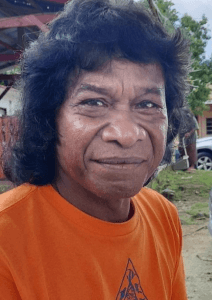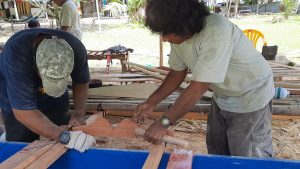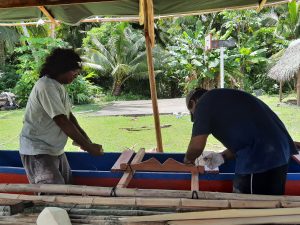Mr. Akilino Albis left formal schooling in third grade after he grew interested in canoe carving and seafaring with his father, Albis. He quickly learned at a very young age and wanted to be the best in building canoes and fishing. He spent much of his young age working alongside his father, earning his favor that eventually led to his traditional canoe building and nautical skills. His mother is from the outer islands of Yap (Federated States of Micronesia), and they moved back and forth from the outer islands of Palau to the outer islands of Yap. 
Mr. Albis tells his story of the time he was traveling to the other islands of Yap when, on the way, his uncle, who was living on the island of Sorol, saw him and took him to live with him. The captain of the state vessel, also a relative, told Mr. Albis to stay on the island of Sorol and wait for his parents. On the island of Sorol, he quickly matured as a young man because he had to provide for his aging uncle and his family. He learned many skills – in fishing and living in harmony with nature on a small island. Mr. Akilino finally returned home with his parents on their next trip to Sorol.
He later wanted to test his navigation skills and led a group of young men on a voyage from his mother’s island of Ifaluk to West Fayu. At his departure, many people, including his family, thought they were all doomed to die. But he successfully navigated the voyage to West Fayu and back, bringing many marine resources for the people. The Chief’s Council summoned him and accused him of stealing traditional Navigation knowledge without the proper authorization. In his defense, he informed the Council that he was a bonafide navigator himself and had evidence to prove it. He went to his house and brought to the Council his navigational mat (Chart) that his father Albis had given him and taught him how to use. One of the Master Navigators looked at the Chart and said, “Oh yes, this young man is a navigator. From our elders, I have heard the story of this other school of navigation with their canoes having the bird’s head. The first time I have set my eyes on the Chart told to me by our elders. This school is for the navigators that are in the Southwestern parts of Palau.” After this, Akilino Albis was welcomed and accepted as a navigator and received permission to navigate voyages across the ocean.
From learning navigation, it was a natural step to learn about carving canoes. If you have a good idea of where you want to go and what the ocean will be like on the journey, you will know how the canoe should be designed and carved to withstand the anticipated conditions.

In addition to canoe building, Mr. Albis says that part of a navigator’s role is to care for his crew as he would for his family. He learned much native medicine from his mother, a respected medicine woman, and his family members. This knowledge helped him save his crew’s lives and many people on the remote islands who look to him for healing when sick or injured. He has helped many people in his lifetime.
Mr. Albis was very excited to be invited by OneReef as a Knowledge Holder to teach at the Traditional Skills Summer Camp on Sonsorol Island in June 2020. He believes that the knowledge he possesses is precious for the younge r generation – for survival, identity, and to increase their resilience to the challenges of living on these small islands in the face of a changing world. He was happy with the turnout at the Summer Camp but said that it is not enough. He believes that the youth he inducted into the traditional canoe club through a conventional ceremony needs to continue their learning daily and weekly for at least five years to gain the confidence to use the knowledge. He believes that OneReef’s mission in partnering with communities like Sonsorol and Hatohobei will help them make this a reality. As is typical of the Micronesian way, Mr. Albis is grateful to the Governor and the people of Sonsorol for allowing him to share his knowledge with the youth. He hopes to continue working with OneReef and the Southwest States of Palau’s leadership in this effort.
r generation – for survival, identity, and to increase their resilience to the challenges of living on these small islands in the face of a changing world. He was happy with the turnout at the Summer Camp but said that it is not enough. He believes that the youth he inducted into the traditional canoe club through a conventional ceremony needs to continue their learning daily and weekly for at least five years to gain the confidence to use the knowledge. He believes that OneReef’s mission in partnering with communities like Sonsorol and Hatohobei will help them make this a reality. As is typical of the Micronesian way, Mr. Albis is grateful to the Governor and the people of Sonsorol for allowing him to share his knowledge with the youth. He hopes to continue working with OneReef and the Southwest States of Palau’s leadership in this effort.